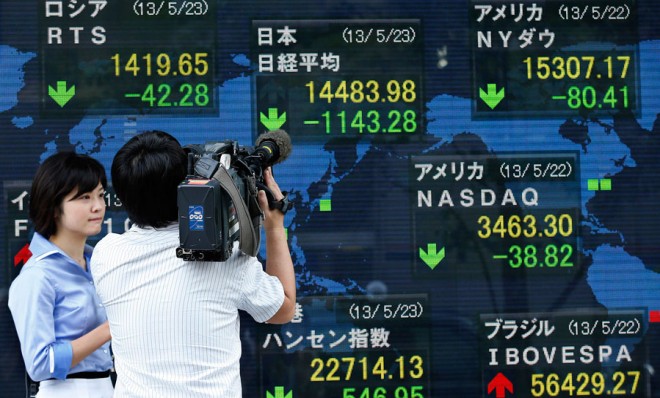What caused Japan's stock market to tumble? 3 theories
The Nikkei average took a plunge, causing global jitters

A free daily email with the biggest news stories of the day – and the best features from TheWeek.com
You are now subscribed
Your newsletter sign-up was successful
After months of soaring prices, Japan's Nikkei stock index plunged 7.32 percent on Thursday, the largest one-day drop since the country's 2011 tsunami and nuclear disaster. All 225 companies on the index saw their share prices fall, with some, such as Mitsubishi, slipping double digits.
It was a such a dramatic dive that jitters quickly spread to markets in Australia, Hong Kong, and South Korea, before hopping to Europe, where stocks in London, Paris, and Frankfurt dropped more than two percent. This morning, U.S. markets dipped in early trading, before eventually recovering.
So what caused global markets to shudder? Here, three factors:
The Week
Escape your echo chamber. Get the facts behind the news, plus analysis from multiple perspectives.

Sign up for The Week's Free Newsletters
From our morning news briefing to a weekly Good News Newsletter, get the best of The Week delivered directly to your inbox.
From our morning news briefing to a weekly Good News Newsletter, get the best of The Week delivered directly to your inbox.
1. A shaky economic report from China:
A preliminary report on Chinese manufacturing showed that in May factory activity slowed for the first time in seven months. Specifically, HSBC's purchasing manager's index fell to 49.6 — just below the 50 mark that demarcates between expansion and contraction.
As CNN notes, "The strength of manufacturing in China is considered a barometer of the global economy because of the nation's role as a powerhouse exporter."
Indeed, China has largely powered the global economy in the post-crisis era, making up for significant slack in Europe and the U.S. Any sign of a slowdown there is cause for concern, particularly for Japan's export-dependent economy, which is particularly vulnerable to the ups and downs of other economies.
A free daily email with the biggest news stories of the day – and the best features from TheWeek.com
2. Dark speculation about the Federal Reserve:
This week, Fed Chairman Ben Bernanke told Congress that while he had no plans to halt the central bank's $85 billion-a-month stimulus plan, he would consider winding it down "as the economic outlook improves."
"A premature tightening of monetary policy could lead interest rates to rise temporarily but also would carry a substantial risk of slowing or ending the economic recovery," he said.
At first, Wall Street responded favorably. But the positive vibes quickly dissipated. Here's the New York Times:
As the day went on, though, traders began to reconsider some of Mr. Bernanke's comments. After the details of the Federal Open Market Committee meeting on April 30 and May 1 were released, many strategists said they were surprised by the number of voices inside the Fed calling for a slowdown in the stimulus effort in the near future.
The minutes said, "A number of participants expressed willingness to adjust the flow of purchases downward as early as the June meeting if the economic information received by that time showed evidence of sufficiently strong and sustained growth." [New York Times]
Markets have come to rely heavily on the Fed's quantitative easing program, which has seen the central bank flood the money supply by purchasing hundreds of billions of dollars worth of assets and securities. Any pull-back would force investors to adjust after years of record-low interest rates, and leave the U.S. economy without a huge crutch. And again, a weaker U.S. economy is bad news for Japan — someone needs to buy those televisions and cars.
3. A natural correction:
Some think the Nikkei's plunge was the inevitable result of a months-long surge driven by the Japanese government's extraordinary economic recovery program — a fiscal policy known as Abenomics, after Prime Minister Shinzo Abe. Between November 2012 and January 2013, the Nikkei Index had jumped 2,300 points, with little correction.
Here's Larry Elliot at the Guardian:
The reason markets have been rising has, of course, nothing to do with real economic conditions and everything to do with the willingness of central banks to print money. In effect, investors have been able to play in the casino with chips liberally provided by the Federal Reserve, the Bank of England and — more recently — the Bank of Japan. Unsurprisingly, they have been having a fine old time of it.
After such a strong rise, some correction has always been inevitable. The real question, however, is whether this is a pause for breath or the start of something more serious — a crash of the sort seen in the early 2000s or during the great recession of 2007-09. [Guardian]
Elliot wasn't the only one to compare the fall to the 2008 financial crisis. Société Générale foreign exchange strategist Sebastien Galy in an email to Business Insider called the 7 percent slip a "Lehman-like" moment.
Carmel Lobello is the business editor at TheWeek.com. Previously, she was an editor at DeathandTaxesMag.com.
-
 The Olympic timekeepers keeping the Games on track
The Olympic timekeepers keeping the Games on trackUnder the Radar Swiss watchmaking giant Omega has been at the finish line of every Olympic Games for nearly 100 years
-
 Will increasing tensions with Iran boil over into war?
Will increasing tensions with Iran boil over into war?Today’s Big Question President Donald Trump has recently been threatening the country
-
 Corruption: The spy sheikh and the president
Corruption: The spy sheikh and the presidentFeature Trump is at the center of another scandal